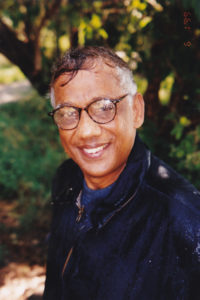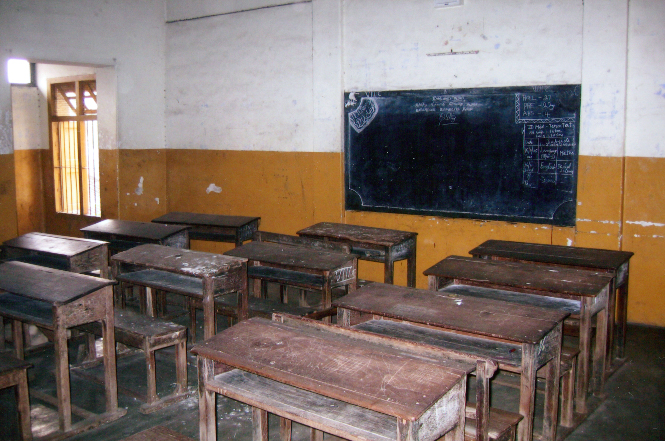In July 1944 I was back in our grandmother’s home in Chennai to get enrolled in the same High School I had left after finishing my 1st Form in 1940. My grandmother, still head of the household, was extremely kind; so was my elder uncle’s wife, Dharmambal, who did all the cooking for the entire household. She was my surrogate mother. I cannot express in words my indebtedness to this lady who helped me during these teen years. My younger uncle, Vaidhyanathan, was in Bangalore undergoing the needed training for his job as a Morse code telegraphist.
To my delight I found that my aunty, Saraswathi, who at that time had three children, had rented one of the apartments in the house. Her first son was my cousin Vaidhyanathan, called Vaidhy, who was six months younger than me, and we enrolled together in the 4th form in the Ramakrishna Mission High School. Vaidhy was my closest buddy and teen age companion for the next five years of my life in Chennai. We were bonded like twins.
My next three years of school were memorable. I had very dedicated teachers for all the subjects, particularly for math and Tamil, but my geography teacher was really exceptional. In those days there were no maps, not even wall-mounted pictures of different countries. He never sat on his chair and read from the text book during his lecturing as the other teachers did. Instead, he paced all around the classroom gesturing, articulating his lessons and asking us to visualize what he said. For example, “One of the longest railroads is the Canadian National Pacific Railway, with five important stations; Montreal, Toronto, Winnipeg, Calgary, and Vancouver.” Then, I do not know why, he pointed his finger at me and said, “You will visit these places one day! And imagine how nice and relaxing will it be when you experience the water spray in one of the highest waterfalls, Victoria Falls in Zimbabwe.” Again he pointed at me. “You will experience this one day!” This gave me a passion for travel, and also helped me to visualize the possibilities of my future.

My geography teacher was right. I did visit Victoria Falls and feel the spray on my face. That was in 1999.
My uncles took turns sitting with us every evening as we two did the homework. They were more like cheerleaders than drillmasters in contrast to my father, who was a strict disciplinarian. I did well in my geometry classes, getting 100% marks. It was as if some cloud had lifted from my brain to do the needed abstract thinking for Algebra and Geometry.
We had no radio in our house and we went to movies only occasionally. For writing there were no fountain pens but only a bottle of ink and a pen with a steel nib. This we carried every day to our school with a blotting paper. Vaidhy and I gained an extraordinary capacity to memorize and repeat verbatim a vast amount of printed information. This was an asset that helped us pass all the hated written examinations at the end of the year. This was during the Second World War and there was severe rationing of practically all essential food items, kerosene, paper, and even firewood. There was a long queue for these items and Vaidhy and I helped our respective families in the shopping.
Just like the Bar Mitzvah in the Jewish culture, there is a custom in the Brahmin caste to initiate teen-age boys to enter the Brahmin community and assume the responsibilities that are required of them in their moral and spiritual growth. This is a special religious ceremony called Upanayanam. The central part of the ceremony is the chanting of a highly revered mantra from the Rig Veda known as the Gayatri Mantra, right into the ears of the teenager. The literal translation goes like this: “O thou Existence Absolute, Creator of the three dimensions, we contemplate upon thy divine light. May He stimulate our intellect and bestow upon us true knowledge.” From then on the boys have to wear a three-strain cotton textile belt (worn across the chest like a sergeant’s belt). They have also have to perform three different daily obligatory prayers, one in the morning, one around noon, and one in the evening at sunset. These prayers are in the Vedic language Sanskrit. Generally no youngster dares to ask their meaning, and neither did I. This ceremony can be held in conjunction with a regular marriage of a family member or separately. I was initiated as a Brahmin during this period when my aunt got married, and I performed these rituals regularly for many years following.
The war ended in Aug 1945 lifting the economic burden the country had sustained since 1939. India got its independence from Brittish rule in 1947. I became every fond of cricket, and so were my two uncles. We never missed the five-day cricket matches played during those years when the English, Australian, and West Indian teams visited India. We still had no electricity in the house. We listened to the radio for the running commentary of these matches in our neighbor’s house, where another class mate of ours, Thiruvenkatam, lived.
I completed my 6th form, and in July 1947 earned the Secondary School Leaving Certificate (SSLC) needed for college entrance. So did my cousin Vaidhy. But earning the certificate involved an unexpected turn of events. We were required to pass the Statewide written examination in six subjects: English, a secondary language, Mathematics, General Science and a combined History and Geography paper. This examination was held each year late in April by the State Education Department who also mandated a uniform curriculum and accompanying text books for each of the subjects to insure uniform standards. The six exams are held on alternating days, on the the same dates throughout the State. In 1947, which was the year in which I took the examination, an unprecedented and bizarre incident took place. On the evening of the day after the second examination, posters appeared in all the public places – libraries, bus stands, train stations – throughout the State, displaying test papers that were to be given for the next four examinations. Though the students did not believe this wide-spread rumor, yet we studied the answers faithfully. Lo and behold, in the third examination, the test questions were the same as those displayed on the public posters. The authorities were in a quandary, but still continued to have the next exam. The test questions for the fourth exam were again the same as displayed. The State overnight announced the cancellation of the four remaining examinations, saying that they would be held on dates to be announced later. It was a rude shock to all of us. Someone in the State Education Deptartment had leaked out the papers in advance, and we had to wait for an additional month to take the re-examination.
There was a very strict and fierce competition for the entrance in the colleges — Loyola, Christian, Pachayapas, the Islamic Muhamudan, and the Presidency. There was a craze for admission into the MPC (math, physics, and chemistry) group courses. Indeed, for Brahmins, gaining admission to the top colleges at that time was akin to winning the lottery. Except for the Presidency College, the others were run by various religious denominations and there was a severe restriction on Brahmin students, unless they had performed extremely well in their high schools.
My high school grades were not the best and my application was rejected by the three colleges I applied to. I had not applied to the Presidency College; it being a state government college, there were quotas for admission based on religion. On the top of that it was a two-year Junior College giving an Intermediate Certificate and not a B.A. or B.Sc. degree. On mere intuition my younger uncle, took both Vaidhy and me to the Principal of the Presidency College and somehow persuaded him to give admission to both of us. The Principal, Mr. Manavla Ramanujan, a very liberal minded man, listened and understood the situation — we two being Brahmin boys that too not with high grades. It was almost a miracle that he gave us admission on the spot with a MPC combination of subjects.
Vaidhy and I joyfully attended the college. I took Tamil as my second language and Vaidhy, Sanskrit. We took the public transport to the college which was about seven miles from our home. We for the first time ate our lunches outside our home in the public restaurants and some times in the College Cafeteria. We also had, for the first time, full trousers and leather shoes.
I had an extremely competent and most enjoyable professor in Chemistry, Mr. Ramdas, who made me fall I love with this subject. His lectures were like listening to fairy tales and he took personal interest in his students’ progress. The chemistry lab work was the most exciting part of the course. As weeks went by I learned making solutions of specific strengths, acid alkali/titration, using a chemical balance meticulously, and scores of other chemical lab procedures. Mr. Ramdas was always there to supervise and critique my handling of the chemicals and glassware. He was an inspiration. I got very high percentage marks in the final exams in Chemistry.
The other subject I loved was Tamil (my own mother tongue), due to the quality and care of the professor who taught the subject. The physics and math teachers on the other hand were mediocre and my grades were average.
During these years, my buddy Vaidhy and I attended regularly and with great interest the religious discourses presented every Friday in the Temple near our home on. Eminent scholars made presentations on the two great epics Mahabarata and Ramayana as well as other mythologies. The stories and anecdotes in these books were fascinating, and we learned about the moral and ethical message they conveyed.
We went to movies only once a month or so. There was no violence or shooting in the movies and no kissing allowed in the Indian films. Even the western movies we saw were heavily censored, with any passionate kissing and love scenes cut out.
I was brought up in an exclusively male dominated society. We learned nothing about money management. When the monthly salary was earned the entire amount was given to the head of the family. Few women went to work, even after receiving their education, and the work force, except in hospitals, was made up of males. My teachers were all males. Young girls were not to be seen after dusk unless they were chaperoned. As a rule girls and boys went to separate schools until they went to college and even there they sat on separate rows. This custom is still practiced throughout India even today.
Marriages traditionally were within the caste you were born into, as inter-caste marriage was forbidden. In my community, marriages were arranged by parents after a suitable match was found based on horoscopes. The boy and the girl were not allowed to meet, except to see each other in a previously arranged party for the two families. The word “divorce” was unheard of in the Hindu families except in the rich and high non-Brahmin class.
There was nothing like sex education in schools. We speculated in low voices on how babies are made during our evening walks with classmates. When one of my friends explained how babies come, I was amused and asked myself a question: how is it that a seemingly pious man like our family priest could do such acts?!
